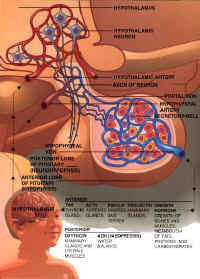Hypothalamus and Pituitary
 The endocrine system
The endocrine system
The nervous system and the endocrine system work together to keep the body in harmony and balance.
The endocrine system is made up of various glands that produce chemical messengers called hormones. Hormones travel through the bloodstream to affect the nutrition, growth, and activity of nearly al the organs of the body.
The control center of the body
The pituitary gland, a tiny organ about the size of a pea, is located at the base of the brain. It is sometimes called the master gland because it controls the other endocrine glands and many physical processes. The pituitary gland is connected to the hypothalamus, an important part of the brain that links the nervous system with the endocrine system. For example, when the nervous system senses heat, cold, pain, danger or any condition affecting the body, the hypothalamus signals the pituitary to go into action.
The pituitary produces hormones needed for growth. It also tells the adrenal glands,thyroid gland, ovaries or testes to make their hormones. These hormones help the body with fluid balance, metabolism, reproduction, sexuality, growth, and development.
When things go wrong
Normally, a feedback system keeps hormones well regulated. A high amount of hormone in the blood sends a signal back to the gland to make less. When the hormone level in the blood drops, the feedback decreases, allowing the gland to begin making more hormone. in such a complex system, many things can go wrong.
Too much of any pituitary hormones may cause overactivity in other glands and can result in a number of problems. An example would be precocious puberty. This means the signs of puberty start at an earlier age than expected. Girls develop breasts and pubic hair, with a growth spurt before the age of 8. Boys have enlarged genitals, pubic hair, and a growth spurt before the age of 9.
Too little of pituitary hormones, a condition called hypopituitarism, may limit the function of other glands. One of the possible problems can be growth hormone deficiency. The signs of this disorder would be a failure to grow in height during childhood and failure to develop signs of puberty by age 13 in girls, and age 14 in boys.
Correcting hormone imbalance
Fortunately, hormone imbalances can often be corrected. Hormone levels that are low can be brought up to normal with synthetic hormones that work just like the ones the body makes naturally. Hormone levels that are too high may be treated with drugs or with other hormones that have an opposite effect. Tests are usually needed to find the cause of the problem so it can be treated in the right way.
Special considerations
Those affected by pituitary disorders may have growth, development and/or school related problems. They may have learning disabilities and poor self-esteem.
It is usually best to get help from medical professionals who specialize in disorders of the endocrine system. They Can provide medical care, information, practical advice, and help with emotional and social concerns.
Endocrine glands help different parts of your body to do their job:
- Chemical messengers called hormones
- Each hormone has a special purpose
- Receptor cells recognize certain hormones
- The bodys “control center”
Hypothalamus
- A link between the brain and the pituitary
- Passes messages between nervous system and endocrine system
- Negative feedback system
- Regulates temperature, hunger, thirst, sex drive, menstrual cycle
- Controls pituitary hormones
Pituitary or “master gland”
- Attached to the hypothalamus in the brain
- Secretes important hormones
Growth hormone: brings about growth of tissues, especially bones and muscles, and works with other hormones to influence metabolism of fats, proteins, and carbohydrates
Prolactin: stimulates the breasts to produce milk following pregnancy
Adrenal-cortex stimulating hormone (ACTH): prompts adrenal glands to produce hormones that help to maintain blood glucose levels, electrolyte and fluid balance, and to produce sex hormones
Thyroid-stimulating hormone (TSH): prompts thyroid gland to produce hormones that control metabolism
Gonodotropins: stimulate ovaries and testicles to produce sex hormones and reproductive cells (sperm and eggs); stores hormones produced by the hypothalamus and releases them when needed
Oxytocin: causes uterus to contract during childbirth – releases milk for breast-feeding
Antidiuretic hormone (ADH): helps body maintain appropriate water balance
Disorders and clinical features
Overactive pituitary (hyperpituitarism) triggers overactivity in other glands
- Rapid childhood growth
- Precocious puberty (early secondary sex characteristics [generally before age 8 in girls, before 9 in boys], accelerated growth and weight gain, early menarche)
- Cushing syndrome (poor growth, weight gain, posterior cervical fat pods or Buffalo hump, protruding abdomen, thin extremities)
- Hyperthyroidism (weight loss, bulging eyes, goiter, jitteriness)
- Hyperprolactinemia (abnormal lactation) and cessation of menstrual periods
Underactive pituitary (hypopituitarism), fails to stimulate function of glands
- Failure to thrive, short stature, slow growth
- Late puberty (initial pubertal changes not present by age 73 in girls [breast buds] and 14 in boys [testicular enlargement])
- Adrenal insufficiency (fatigue, weakness, hypotension)
- Hypothyroidism (delayed growth, brain development adversely affected if not adequately treated in first 3 years of life)
- Diabetes insipidus (excessive thirst and urination)
- Panhypopituitarism (absence of two or more other pituitary hormones; clinical features depend on which of the trophic hormones is deficient)
Therapy
- Hormone replacement therapy
- Hormone suppression therapy
